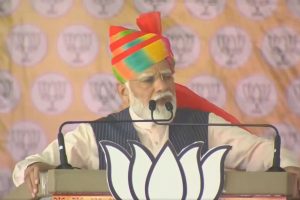The Collegium exposes the weakness of the system. It lacks transparency, accountability and objectivity. A creation entirely of the judiciary in the 1993 Second Judges case ruling, there is no mention of Collegium anywhere in the Constitution. It is not answerable to anyone.
Judges appointing judges is unheard of in vibrant democracies but remains firmly entrenched in India for more than a quarter century. The Collegium system to select judges to the higher judiciary created by judges in 1993 lacks transparency and its proceedings are shrouded in secrecy. Apart from growing evidence of incompetent and ethically compromised persons getting appointed as judges under this system, it is incapable of filling vacancies in time resulting in an avalanche of litigations pending in courts. While the Supreme Court has 28 judges now against the sanctioned strength of 31, the 25 High Courts in the country with a sanctioned strength of 1,079 have only 673 judges. On an average, the National Democratic Alliance government of Narendra Modi has been able to appoint 104 judges in a year which is an improvement on the UPA government’s record of 83 judges in a year.
The overworked Chief Justice of India and the 25 High Court Chief Justices simply do not have the time to spare for convening their respective Collegiums to select judges in conformity with the high standards set out in various judgments by the Supreme Court. Often names are proposed on extraneous considerations such as caste, religion, political leanings and even quid pro quo and the future of the judiciary as an institution of integrity is ignored. In the United Kingdom, whose systems we follow, merit is the sole basis of selection to higher judiciary.
The Supreme Court collegium’s 10 January decision elevating Karnataka Chief Justice Dinesh Maheshwari and Justice Sanjeev Khanna of the Delhi High Court as Judges of the Supreme Court, superseding the 12 December 2018 Collegium’s decision to elevate Rajasthan Chief Justice Pradeep Nandrajog and Delhi High Court judge Rajendra Menon to the Supreme Court are mired in controversy. The events leading up to these unprecedented events have shaken not only the faith of Bar Councils in the country, but also the confidence of the public in the efficacy of the system of judges appointing judges. Justice Ruma Pal, retired Judge of the Supreme Court had said, “Collegium affairs are the best kept secret in the world.” The text of the decision taken by the Collegiums on 10 January says, “It was appropriate to have a fresh look at the decision taken on 12 December 2018 in the light of some additional material that had become available. After extensive deliberations on 5-6 January 2019, the newly constituted Collegium deemed it appropriate to have a fresh look at the matter to consider the proposals in the light of the additional material that became available.”
Justice Kailash Gambhir, a retired Delhi Court Judge, in a letter to the President of India dated 14 January, which has gone viral, said, “The elevation of Sanjeev Khanna, nephew of the legendary Justice HR Khanna, would supersede as many as 32 judges who include many Chief Justices casting aspersions on their intellect, merit and integrity… It cannot be forgotten that it is just one and a half months back the then Collegium had superseded Dinesh Maheswari and now out of the blue he has become more suitable within a short gap.”
It is clear from the recent chain of events that Chief Justice Ranjan Gogoi has assumed the role of master of the Collegium as well. Not forwarding to the government the Collegium’s resolution of 12 December last is procedurally flawed. In an article published in ***Indica News***, Justice Markandey Katju, former Chief Justice of Delhi and Madras High Courts, Judge of the Supreme Court and chairman of the Press Council of India, raises some pertinent questions regarding the recent appointments in the higher judiciary. In a letter to the CJI, he asks why the recommendation of the Collegium headed by then CJI Thakur for transfer of Justice Valmiki Mehta of Delhi High Court was revoked. Justice Katju says three judges of Delhi High Court ~ Justice Pradeep Nandrajog (present CJ of Rajasthan High Court), Justice Gita Mittal (present CJ of Jammu & Kashmir High Court) and Justice Ravindra Bhat ~ were superseded by Justice Sanjiv Khanna who was elevated to the Supreme Court. As former CJ of Delhi High Court, Justice Katju says he personally knew all the three superseded judges who had “impeccable record of integrity and competence”. In fact, the Collegium which met on 12 December last recommended Justice Nandrajog to be elevated to the Supreme Court. It was signed by all five members of the Collegium but never forwarded to the government by the CJI. The Collegium specifically rejected Justice Maheshwari for elevation on 12 December but the 10 January meeting recommended him for elevation to the apex court. Did he become suddenly competent in the intervening three weeks, asks Justice Katju in his article? That a person like Justice CS Karnan, who was convicted of misconduct and imprisoned, could join the ranks of higher judiciary through the Collegium exposes the weakness of the system. It lacks transparency, accountability and objectivity. A creation entirely of the judiciary in the 1993 Second Judges case ruling, there is no mention of Collegium anywhere in the Constitution. It is not answerable to anyone. Of the three pillars of government ~ executive, legislature and judiciary ~ the judiciary enjoys a preeminent position and can correct the other two, but there is no such check-and-balance as far as the judiciary is concerned. That is all the more reason judges should not be appointing judges. As long as the present system of appointment of judges continues, considerations other than merit would creep in.
The time has come for the Union government to consider reintroducing the National Judicial Appointments Commission Bill with suitable changes to make it acceptable to the judiciary. The NJAC Act passed by Parliament was struck down by the Supreme Court on the plea of safeguarding the independence of the judiciary. The Constitution vests the power to appoint judges of the superior courts in the President of India, which means the Union Cabinet, in consultation with the CJI and CJs under Articles 124 and 217. The annulled NJAC Act only sought to restore the constitutional position. The revised NJAC Bill, unlike the impugned Act, should not bring back the dominant voice of the political class by including the Law Minister, two eminent jurists nominated by the government and the Leader of the Opposition.
Primacy to the judiciary in the appointment of judges is part of the basic structure, but it is worth recalling BR Ambedkar’s speech in the Constituent Assembly debate. “The Chief Justice, after all, is a man with all the failings, all the sentiments and all the prejudices which we as common people have. To allow the Chief Justice practically a veto upon the appointment of judges is really to transfer the authority to the Chief Justice which we are not prepared to vest in the President or the government and it is a dangerous proposition,” he had said.
The judiciary must accept that independence and accountability are two sides of the same coin. The proposal to set up a National Judicial Commission for the appointment of judges was one of the key recommendations of the National Commission to Review the Working of the Constitution headed by former Chief Justice MN Venkatachalliah, established by the first BJP Prime Minister Atal Behari Vajpayee, in March 2002. The task of appointing the right persons to man our higher judiciary has to be done with utmost diligence and care. A separate, fulltime commission will, besides safeguarding judicial independence, provide an opportunity to dispense justice without fear or favour. However, the efficacy of the National Judicial Appointments Commission will depend upon its composition which, though tilting on the side of members of the judiciary, should be broad-based.
(The writer is a veteran journalist and former Director of The Statesman Print Journalism School)











